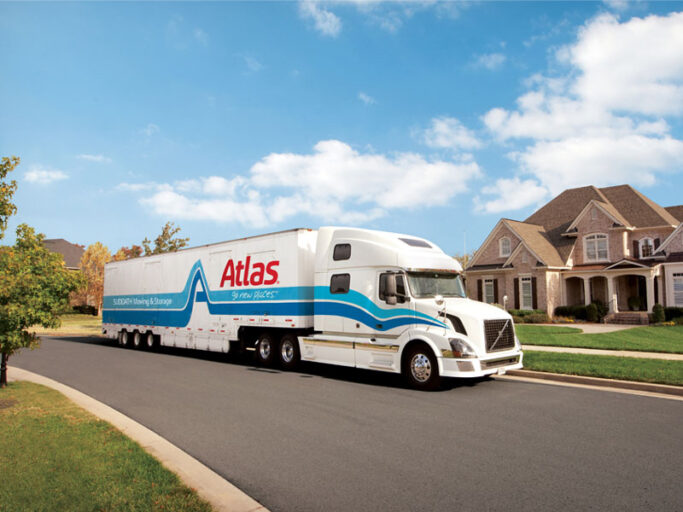Moving Tips & Resources
How Do Long Distance Movers Charge and Calculate Cost?
When you’re planning a move and considering what relocation experts to use, it’s natural to focus on the movers’ long distance costs and what services you’ll receive in exchange for them. Here, we’ll go over ways in which long distance movers typically calculate their costs so you have a better understanding of what you might expect.

Weight of Belongings
This is generally the largest factor when calculating movers’ long distance costs with heavier shipment weights costing more than less weighty ones. Fortunately, this can be the factor most under your control. How? Well, most people have plenty of belongings that they don’t really use anymore and can toss household items that are no longer useful and sell or donate ones that others can use.
Selling your unwanted goods can take place at rummage sales or online marketplaces—or, in some cases, you can directly sell the items to people you know want them. Although donating goods won’t directly give you cash like selling them will, IRS-qualified charitable donations can help you at tax time. To benefit, you’ll need to carefully itemize and value your donations and keep records, which can be an appraisal of the donated property or acknowledgement letters from the charities themselves. The IRS offers guidance to help you determine if donations to a certain organization will allow you to write off your contributions along with procedures to benefit from them.
Whether you choose to sell or donate (or use a combination of both strategies), by reducing the weight of what will be transported, you can effectively and efficiently reduce your moving costs.
Distance of Your Move
A long distance move, by its very definition, is a further trek than one that’s simply across town—and mileage involved is another key factor in movers’ long distance costs. In general, local moves are considered ones that are less than fifty miles with long distance ones consisting of more than fifty miles from your previous home to your new one. They can be intrastate (within the same state) or interstate (with the new location in a different state than your current home).
Once you’ve decided upon a new home, this factor isn’t under your control. The mileage simply is what it is. So, focus on whittling down costs in the other areas, particularly with the weight of what you’ll have transported.
Add-On Services
Although the weight of your transported belongings and the mileage required are the two main factors in movers’ long distance costs, many people planning to relocate take advantage of optional services to streamline their moves. Three of the most common are described here.
Packing and Unpacking Services
Whether you pay professionals to do your packing or you’ll do it yourself, there are costs involved. When doing it yourself, costs include boxes and packing materials as well as—perhaps most importantly—your time. When choosing packing and unpacking services at Daryl Flood, you can select between full and partial packing services; when you do, you’ll save time and have peace of mind by knowing that we’re using the best packing supplies and are handling your belongings with expertise. Although the focus is often on the packing aspect of this service, unpacking services allow you to settle into your new home without worrying about all of those unpacked boxes. Note that not all moving companies offer packing and unpacking services, but it’s a sign of trustworthiness if they do—an indication of a well-established moving company.
Storage Services
The availability of storage services can be another sign of a well-established professional mover, and you may decide to take advantage of these services. Common reasons why someone might include decluttering their home to attractive stage it for sale; keeping belongings in a safe and secure location while the new home is being built or remodeled; or because there is still a question about what household items to keep and which ones to sell or donate.
Daryl Flood—a leader in moving services in Texas—also provides outstanding storage services throughout the state: a total of 500,000 square feet of storage. We provide safe, secure storage for short term and long-term needs in Texas-sized storage spaces.
Custom Crating Needs
If you’ve got belongings with unusual sizes and/or shapes, they will require custom crating, and this can be factored into your movers’ long distance costs.
Miscellaneous Factors
If you’ve got an especially complex move, it may require more than the standard number of movers in the crew. In those cases, the moving company may charge more for the added personnel.
If you want to move when demand is especially high, prices may be higher during those times; the peak moving system is typically defined as May through September. If you can move outside of those times and want to save money, ask if this will make a difference in the pricing.
It’s not unusual for a moving company to include any third-party charges they’d need to cover. This can range from parking fees to rigging services they’ll need to use to get especially large items out of your home.
Calculating Costs of a Long Distance Move
The above items are ones that movers typically charge for in their quotes; how much each will charge, specifically, depends upon their pricing structures. What’s most important is to get an accurate quote from your movers of choice and then ask any questions that you have about the estimate.
Valuation Coverage
Then there’s the issue of insurance. Moving companies can’t legally sell insurance for your items. What they offer is something similar called “valuation coverage.” Before your move, you’ll determine the value of what’s being transported by your movers, and then you can buy the appropriate amount of valuation coverage from your movers. When you do this, you must get this coverage for all of your household goods being transported; if you have high-value items, you can then declare them separately, but you cannot just get valuation coverage on high-value goods.
You can then choose between full value coverage, which is based on what you paid for the goods, or actual value coverage, which covers today’s worth of the items. You can also select a deductible level, which can start at zero.
If you decline this coverage, you’ll still have a certain amount of free coverage: sixty cents per pound for each item. If your reaction is that some of your belongings are worth much more than sixty cents per pound, you’re right.
Options for more coverage can include buying additional valuation coverage from your movers, if available from them, and getting the coverage you need from a third party.
Professional Long Distance Moves with Daryl Flood
Daryl Flood will provide you with the dependable long distance move you want and need—personalized for your unique needs with transparent pricing and an easy-to-understand quoting process. If you have questions about our movers’ long distance costs, just ask! We’re here to help, ready and willing to answer all of your questions.
Our team has been providing families like yours with high quality moves for more than forty years now with our moving crews carefully vetted and thoroughly background checked and trained. We’re here to support you along every step of the way, flexibly responding to your needs. You’ll benefit from a dedicated move coordinator, too, who will help you from the moment you book your move until the last of your household goods are safely delivered. That’s simply the Daryl Flood way! Contact us today to get started.





